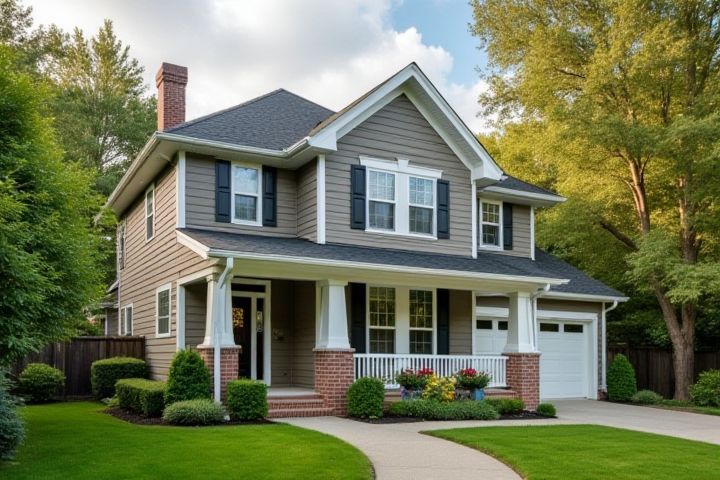
Several factors influence house resale value, including location, which plays a pivotal role in desirability and market demand. The condition of the property, encompassing renovations and general upkeep, directly affects buyer perception and pricing. Nearby amenities, such as schools, parks, and shopping areas, can enhance the appeal and value of a home. Market trends, including the local economy and comparable sales in your neighborhood, help determine current market value. Lastly, the size and layout of the property, along with energy efficiency features, offer additional incentives for potential buyers, enhancing resale potential.
What Factors Influence House Resale Value
Location
Location plays a pivotal role in influencing house resale value, with proximity to essential amenities such as schools, parks, and shopping centers significantly enhancing desirability. Factors like neighborhood safety, overall aesthetics, and community engagement also contribute to the perception of a location's value. Access to transportation options, such as highways and public transit, can further elevate a home's appeal, making commuting more convenient for potential buyers. Additionally, the quality of local schools and their performance ratings often attract families, driving up property values in those sought-after neighborhoods.
Local market conditions
Local market conditions play a pivotal role in determining house resale value, with factors such as supply and demand being crucial. A neighborhood experiencing rapid population growth often sees home prices increase due to heightened demand, while areas with an oversupply of homes may see a decline in property values. Furthermore, the presence of quality schools, proximity to amenities, and low crime rates significantly enhance desirability, driving up home prices. Analyzing local economic indicators, such as employment rates and average income levels, can provide insights into future resale potential and market stability.
Home size and usable space
Home size significantly affects resale value, as larger homes typically attract higher offers due to the extra living space they provide. Usable space, including layouts that maximize functionality--such as open floor plans or efficiently designed rooms--can enhance appeal and potentially increase market value. Outdoor areas, like backyards and patios, also contribute to usable space, allowing for additional living options that buyers often seek. When evaluating your home's resale potential, prioritize both square footage and the quality of usable space to optimize value.
Renovations and updates
Renovations and updates significantly impact house resale value, with kitchen remodels yielding an average return on investment (ROI) of about 80%. Bathrooms, particularly when modernized or expanded, can increase home value by approximately 60%. Energy-efficient upgrades, such as new windows or HVAC systems, not only enhance property appeal but can also boost resale prices by up to 10%. A well-maintained exterior and updated landscaping can enhance curb appeal, potentially increasing your home's value by 5% to 15%.
Curb appeal
Curb appeal significantly influences house resale value, accounting for approximately 7-14% of the overall selling price. Key elements include landscaping, exterior paint condition, and the overall cleanliness of the property. For instance, well-maintained gardens or fresh paint can enhance a home's attractiveness, enticing potential buyers and leading to quicker sales. Research indicates that homes with high curb appeal sell up to 15% faster than those lacking visual appeal, underscoring its crucial role in real estate.
School district quality
The quality of a school district significantly influences house resale value, often reflecting in higher property prices. Homes within top-rated districts can command up to 20% more compared to those in lower-rated areas. Parents prioritize access to quality educational institutions, leading to sustained demand for properties near top schools, which can result in quicker sales and fewer price reductions. Additionally, neighborhoods with high-performing schools typically see increased home values over time, making them a worthwhile investment for buyers.
Age and condition of the house
The age of a house significantly impacts its resale value, as older properties often exhibit outdated features that may require renovation or upgrades. A home built over 30 years ago might need essential systems like plumbing or electrical wiring updated, which can deter potential buyers. Conversely, newer homes typically attract buyers due to modern design elements and energy-efficient technologies, often commanding a premium of 10-20% over older dwellings. The condition of the property further influences its market appeal; well-maintained homes with features like fresh paint, updated appliances, and a pristine landscape can enhance perceived value by up to 15%, making it crucial to invest in regular maintenance.
Comparable sales in the area
Comparable sales, or "comps," are crucial in determining a house's resale value, as they provide a benchmark based on recent transactions of similar properties in the neighborhood. The square footage, number of bedrooms and bathrooms, and overall condition of these comps play significant roles in pricing strategy. Local market trends, such as supply and demand dynamics and economic factors, further influence resale values by dictating buyer interest and competition. Understanding the average price per square foot from these comparable sales helps you set a competitive price that aligns with current market conditions.
Economic indicators
Economic indicators such as unemployment rates, interest rates, and inflation significantly influence house resale values. A lower unemployment rate generally signals a stronger job market, boosting buyer confidence and increasing demand for homes. Conversely, rising interest rates can deter potential buyers, leading to decreased home prices as sellers compete to attract offers. Monitoring inflation trends is crucial, as elevated inflation can erode purchasing power, affecting how much buyers are willing to pay for homes.
Interest rates
Interest rates significantly impact house resale value, as they directly affect mortgage affordability. When interest rates are low, borrowing costs decrease, enabling more buyers to enter the market and potentially driving up property values. Conversely, high-interest rates can lead to reduced demand, causing home prices to stagnate or decline. For homeowners considering resale, understanding prevailing interest rates is crucial, as a 1% increase can reduce purchasing power by approximately 10% for buyers.
